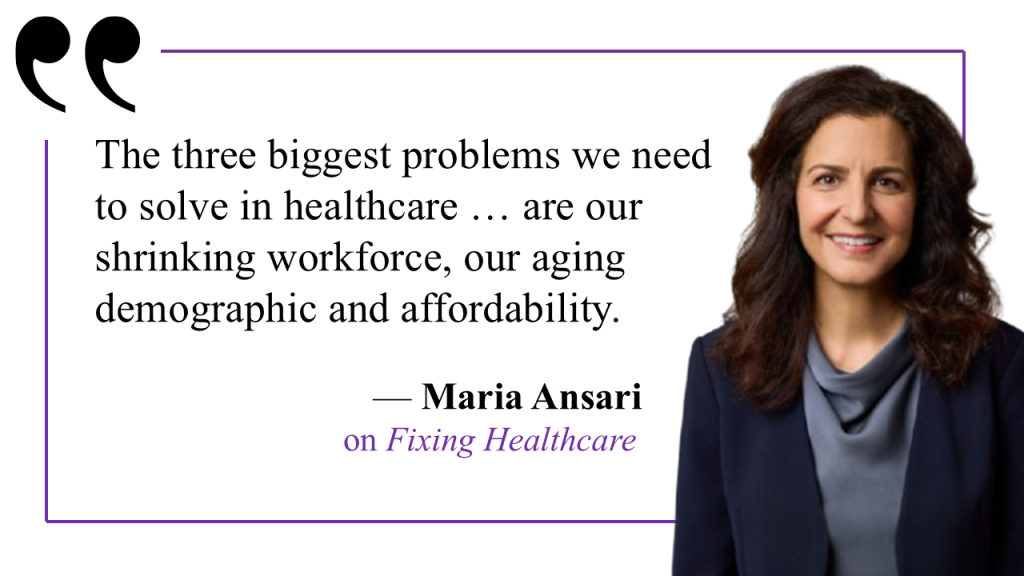Podcast: Play in new window | Download
Subscribe: Spotify | Email | RSS | More
In this special episode of Fixing Healthcare, hosts Dr. Robert Pearl and Jeremy Corr welcome Dr. Maria Ansari, CEO of The Permanente Medical Group, Northwest Permanente and Mid-Atlantic Permanente Medical Group.
In this interview, Dr. Ansari offers a forward-looking perspective shaped by deep experience in value-based care and technological innovation. The conversation is part of Season 10’s focus on how technology—particularly generative AI—can reshape American medicine.
When asked about the three most transformative technologies of the next decade, Dr. Ansari reframes the question around three existential challenges in American healthcare: a shrinking clinical workforce, a rapidly aging population and the growing unaffordability of care. She then connects each challenge to a corresponding technological solution.
- Easing workforce strain with ambient and generative AI.
With an expected shortfall of 120,000 physicians by decade’s end, Dr. Ansari emphasizes the urgent need to “get doctors back to doctoring.” Kaiser Permanente has deployed ambient AI tools to more than 22,000 physicians, helping automate documentation and reduce inbox burden. Generative AI now drafts personalized responses to patient messages, allowing doctors to serve as editors rather than authors. And in oncology, AI tools already help match complex cancer cases with the most effective treatment options, accelerating the delivery of cutting-edge care. - Supporting aging populations with predictive analytics and remote care.
As patients grow older and sicker, AI-driven tools like digital care navigators and remote monitoring systems are helping close the gap between provider capacity and patient needs. One standout example: Kaiser’s “Care Plus” program uses AI to predict emergency department visits and triage patients to home-based or ambulatory care, reducing avoidable hospitalizations. Dr. Ansari also highlights emerging tools like wearables and digital “twins” to support self-management of chronic conditions like heart failure and prediabetes. - Making care more affordable through prevention and personalization.
Dr. Ansari argues that real cost savings in medicine come from avoiding diseases in the first place. With AI-powered early detection tools (such as those that analyze subtle breast imaging markers), The Permanente Medical Group identifies cancer risks invisible to the human eye. These technologies, paired with systems like advanced alert monitoring in hospitals, are saving thousands of lives annually by preventing complications before they arise.
Throughout the interview, Dr. Ansari is careful to position AI as “augmented intelligence,” a tool to enhance, not replace, human judgment. Whether improving medical education, empowering patients or reshaping the future of chronic disease, she calls for bold leadership and rapid adoption.
“If you want to have happy patients, you also have to have happy doctors,” she says, making a strong case for technology that supports both.
* * *
Fixing Healthcare is a co-production of Dr. Robert Pearl and Jeremy Corr. Subscribe to the show via Apple, Spotify, Stitcher or wherever you find podcasts. Join the conversation or suggest a guest by following the show on Twitter and LinkedIn.

